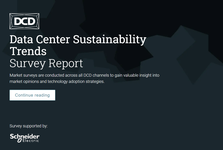The data center community is at a significant crossroads. As early as 31 October this year, the European Union will adopt a new Corporate Sustainability Reporting Directive (CSRD) that will fundamentally change the way our industry works.
The new directive will be the first mandatory sustainability reporting framework with which EU data center investors, operators and users have to comply. Aligned with the EU Taxonomy for Sustainable Activities, the CSRD will require companies to report on how their business activities impact both people and the environment.
The aim of the legislation is to ensure companies develop a more responsible approach to business and, in doing so, radically changes the type and scope of sustainability reporting a company needs to undertake.
All must report
In particular, under the EU Taxonomy, the CSRD will extend sustainability reporting to all large and listed EU companies - increasing the number of EU-based entities subject to EU sustainability reporting standards from 11,000 currently to around 50,000 by 2024.
Being headquartered or listed outside the EU does not offer exemption. If an organization has EU-based subsidiaries that meet the minimum requirements, reporting will still need to be made under the CSRD.
Compliance also needs to happen soon. It is anticipated that companies will first need to report in accordance with CSRD in January 2024 (for the 2023 financial year). This means that preparations for what data needs to be captured and how, must happen before the end of this year.
Of course, this does not just affect data center operators. EU-based data center users will need to report on their company’s impact (including technology infrastructure) and include offsets. They will need to show due diligence that their contracted suppliers comply. Investors too will want to ensure their funds score high on the sustainability assessment. This double materiality – reporting on a firm’s financial value as well as its impact on the world at large - will be a new way of working for most companies and require more comprehensive due diligence.
Data centers aren't prepared
So, is the data center industry ready? In short, no.
It is estimated that while over 80 percent of operators expressed the importance of sustainability in their annual reports, less than half that number (40 percent) have a defined plan in place to make data centers climate neutral by 2030.
This needs to change. We as a data center industry need to act with greater urgency. We need to close the gap between good intention and direct action, otherwise our sector will lose credibility. A lack of transparency, consistent KPIs and alleged greenwashing does nothing to enhance reputations.
Until now adherence to a long line of self-regulatory frameworks – including the European Code of Conduct for Data Centers and the Climate Neutral Data Center Pact – has been voluntary. However, the world has changed and continues to do so, and with it the role of data centers.
As we all know, increased digitization has increased demand for data centers and for the resources (energy, land and water) to support them; even when allowing for advancements in technology and efficiency that have facilitated offsets in power consumption. It would be next to impossible to maintain economic growth without this technology, but it needs to be better understood and applied.
Sustainability and its ‘transparent’ measurement need to be at the forefront of our mind; it is far more efficient to embed sustainability from the outset of a project than trying to reverse engineer sustainability into a live center. We need to work together to curb emissions and energy demand growth but, just as importantly, align on the practical application of consistent, transparent metrics that can report on this change.
It’s imperative that the data center community move beyond goal setting and start putting detailed policies, controls and plans in place. Let’s not leave it too late. Let’s work together. The time to act is now.





